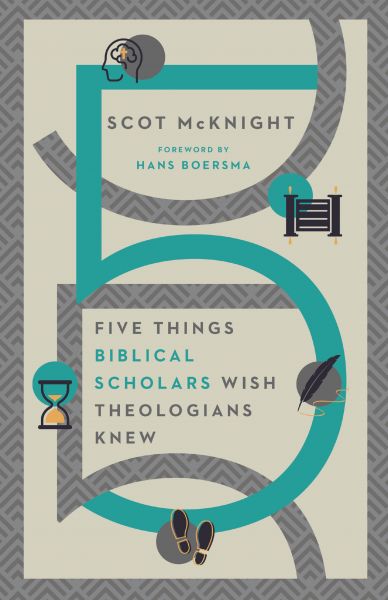Five Things Biblical Scholars Wish Theologians Knew
The disciplines of biblical studies and theology should serve each other, and they should serve both the church and the academy together. But the relationship between them is often marked by misunderstandings, methodological differences, and cross-discipline tension.
New Testament scholar Scot McKnight here highlights five things he wishes theologians knew about biblical studies. In a companion volume, theologian Hans Boersma reflects on five things he wishes biblical scholars knew about theology.
With an irenic spirit as well as honesty about differences that remain, McKnight and Boersma seek to foster understanding between their disciplines through these books so they might once again collaborate with one another.
Scot McKnight (PhD, University of Nottingham) is professor of New Testament at Northern Seminary in Lombard, Illinois. He is the author of many books, including Reading Romans Backwards, Pastor Paul, The King Jesus Gospel, and commentaries on James, Galatians, and 1 Peter. He is also the coeditor of the Story of God commentary series and general editor of the forthcoming second edition of the Dictionary of Paul and His Letters.
Foreword by Hans Boersma
Acknowledgments
Introduction
1. Theology Needs a Constant Return to Scripture
2. Theology Needs to Know Its Impact on Biblical Studies
3. Theology Needs Historically Shaped Biblical Studies
4. Theology Needs More Narrative
5. Theology Needs to Be Lived Theology
Conclusion
Bibliography
Name Index
Scripture Index
"Biblical scholars often complain about theologians, and theologians often complain about biblical scholars. What is it that biblical scholars would like theologians to know? Who better than Scot McKnight to answer this question? Wise and experienced, McKnight winsomely speaks to our theological colleagues about five things we biblical scholars want them to know, and the result will be better communication and collaboration with our theologian friends. Thank you, Scot, for providing this fascinating and to-the-point analysis."
"Can't you two get along? The Bible scholar and systematician, fists swinging, are siblings that love to hate each other. Not only does this book show how biblical scholarship and theology serve complementary aims, it also highlights the best of recent integrative scholarship. Scot McKnight has delivered a knockout."
"It is greatly encouraging to see scholars bridging the divide between biblical scholars and systematic theologians, as this will only benefit us all in the long run. In this latest volume, Scot McKnight generously and irenically pushes systematic theologians to pay attention to some oft-neglected themes: Scripture itself, exegesis and historical context, narrative, and lived theologies. His is a fair and even-handed appraisal, even giving credit where credit is due to the value of systematics! This volume will be useful for professors and students alike and, happily, will further the pursuit of interdisciplinary engagement."
"Like siblings who were separated by divorced parents, biblical studies and theology already have much in common but also need to reacquaint themselves with one another. Addressing key issues and key voices, Scot McKnight helps foster a much-needed reconciliation between these two disciplines that often speak in different ways and value different evidence for their conclusions. This conversation is necessary for the vitality of the church and the academy."
"In the contest of exegesis versus theology, this book offers a way out of methodological shortcomings in both disciplines. Scot's approach unites theological transcendence with historical exegesis and expounds the primacy of Scripture in the context of the church's tradition. Scot is one of the few New Testament scholars who is also conversant in historical theology. Protestant, Catholic, and Orthodox readers will find this book to be wise, insightful, and pioneering."
"This book (and its companion) provides a fascinating insight into theology and biblical studies. In his conversation with theologians, McKnight not only raises important methodological questions but also surveys the field of biblical studies and offers some prospects for its future—making this an important read for theologians and biblical scholars alike."
"We modern biblical scholars and theologians tend to work away in our separate silos, wishing 'the other team' respected and employed our work as much as we think they should. There are a few important projects that bring some of us together from time to time, but the kind of honest conversation promoted here is generally hard to find. Scot McKnight doesn't presume to provide us with the last word or even the penultimate word for the dialogue. But this is a very important contribution toward generating the ongoing conversation that will benefit not only biblical scholars and theologians but, most importantly, the church and its mission."
"While biblical and theological studies are like separate tribes, each with its own language, rules, and culture, Scot McKnight begins a friendly conversation with theologians from the biblical studies side, showing how theologians can use the Bible more helpfully in their discipline and contribute positively to his world of biblical studies. McKnight's advice to theologians will hopefully be heard and heeded and contribute to breaking down the self-enclosed silos of divinity studies. This book, combined with the sister volume by Hans Boersma, makes for a great conversation."
"Thankfully, we live in a day when many theologians want to read the Bible carefully and do theology biblically and when many biblical scholars want to read the Bible theologically and do theology carefully. We need to listen to one another with clarity of sight and charity of affection. This book can help us listen better, and we all may benefit from it." weniger anzeigen expand_less
Versandkostenfreie Lieferung! (eBook-Download)
Als Sofort-Download verfügbar
- Artikel-Nr.: SW9780830855179110164
- Artikelnummer SW9780830855179110164
-
Autor
Scot McKnight
- Mit Hans Boersma
- Wasserzeichen ja
- Verlag IVP Academic
- Seitenzahl 192
- Veröffentlichung 07.09.2021
- ISBN 9780830855179
- Mit Hans Boersma

